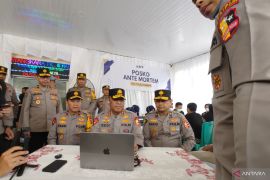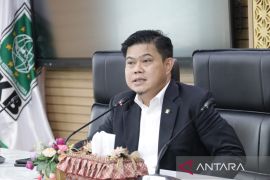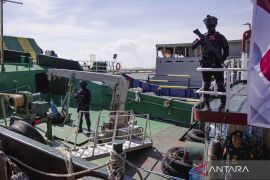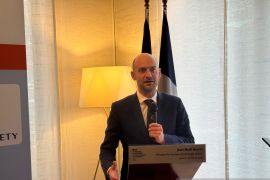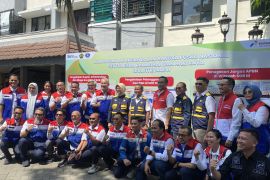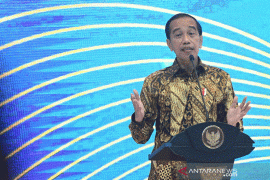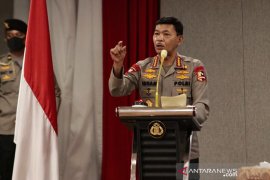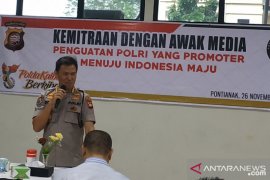In a limited meeting with the chief officials of offices concerned with drug problems on Wednesday, he said narcotics trafficking topped the list of problems being faced by Indonesia at the moment.
In view of this, concerted efforts must be made to fight this with all offices concerned improving their coordination.
Every concerned institution must keep aside sector egoism in tackling the problem and they must work together to fight this menace, the president said at the meeting.
The fight against drugs must involve the National Anti-Narcotic Agency (BNN), National Police, Justice and Human Rights Ministry, Customs and Excise Directorate General, Education and Culture Ministry, Health Ministry, and Social Affairs Ministry, among others.
Meanwhile, President Jokowi as he is also called, estimated that about half of all illegal drugs in Indonesia are circulated through correctional institutes.
In view of that he called on all officials in charge to tighten control at penitentiaries across the country "particularly, prisons which host narcotics convicts. With the help of a military backup they should be checked through impromptu inspection once or twice a month by the National Narcotics Agency (BNN)," he said.
The President added, "rehabilitation of addicts and narcotics victims should also run effectively" with regards to eliminating the circulation of illegal drugs.
The meeting was attended by ministers and leaders of relevant institutions, such as Social Affairs Minister Khofifah Indar Parawansa, Education and Culture Minister Anies Baswedan, National Police Chief Gen. Badrodin Haiti, and Indonesian National Defense Forces (TNI) Chief Gen. Gatot Nurmantyo, in addition to BNN Head Budi Waseso, Minister and State Secretary Pratikno, Coordinating Minister for Political, Legal and Security Affairs Luhut Binsar Panjaita, and Cabinet Secretary, Pramono Anung.
The National Narcotics Agency (BNN) said it will use the money laundering law to charge drug trafficking suspects.
"All drug trafficking suspects should be charged with money laundering," BNN Chief Comr. Gen. Budi Waseso said after the meeting.
The use of the money laundering law against drug traffickers is a bid to stamp out drug trafficking from the country, he added.
All drug traffickers are members of international syndicates, and they can still control the illegal drug trade even from their prison cells as they have a lot of money, he said.
Therefore, the money laundering law is needed to charge drug suspects, he added.
National Police Chief General Badrodin Haiti said the number of narcotic cases in the country had continued to increase every year.
In 2015, tons of marijuana, methamphetamine and a million ecstasy pills had been confiscated by the police.
"Based on our data, the number of traffickers, users and producers is really big. It has increased by 13.6 percent every year," he said.
During the period, the police had arrested 50,178 suspects involved in 40,253 cases in addition to around 665 cases dealt with by the National Narcotics Agency (BNN).
"This number is huge. More than half of our penitentiaries are filled with narcotic detainees. It is really alarming," he said.
He reiterated that the tons of marijuana and more than one million ecstasy pills that have been confiscated comprised only around 20 percent of the total narcotic drugs circulating in the country.
Breaking down the confiscated drugs Badrodin said, "23.2 tons were marijuana, 1,072,329 ecstasy pills and 2.3 tons of methamphetamine have been confiscated. The amount of heroin and cocaine that has been confiscated is smaller. In addition to those confiscated by BNN, all these drugs could kill a lot of our citizens."
"This is really an emergency situation and therefore we have declared war against narcotics," he said after the meeting.
In view of these developments, General Badrodin also emphasized the importance of prevention measures by all ministries/state institutions, firm law enforcement and reduction in demand.
"A lot of trafficking is still controlled from inside the prisons. We will close all access, including through entertainment centers while rehabilitation will also be increased to reduce demand," he stated.
The Army Strategic Reserve Command (Kostrad) had recently arrested a number of its members as well as civilians and police officers during an operation at a Kostrad housing complex in South Jakarta.
General Badrodin Haiti said there are a total of 33 people from TNI (military), the police and civilians, including a House of Representatives member. Their cases are still being investigated.
"It was reported by a defense forces commander that the number of TNI members involved is 19, the number of police members and civilians is five plus nine DPR members," he said.
Army spokesman Brigadier General, M Sabrar Fadhilah said on Thursday that TNI members, who were proven guilty in the case, would certainly face harsh sanctions.
"Harsh sanctions would be imposed on them, including there being discharged from the army," he said.
Narcotic abuse has penetrated on all fronts and has caused deep concern for the public. Even the President has placed Indonesia under narcotic emergency, he stated.
"TNI Commander General Gatot Nurmantyo, as well as the army chief of staff, have also declared war against narcotic drugs," he said.
BNN Chief Budi Waseso said the government will immediately set up a special task force to be specially assigned to deal with problems related to narcotic drugs, including efforts to eradicate and prevent narcotic drugs distribution and the rehabilitation of drug victims.
"There will be a special task force to tackle narcotic problems in an integrated manner. So narcotic eradication will be tackled jointly in line with their respective roles," he said.
The task force members will come from ministries and related institutions under the leadership of BNN.
"With the presence of the special force, it is hoped that concerted efforts are made in the fight against narcotic drugs and coordination is made easier," he said.
BNN on Thursday conducted a sweeping operation against foreign nationals staying in the Kalibata City apartments in South Jakarta as they were suspected of being part of an international drug ring.
"The sweeping raids were conducted as a follow-up to the information we had received that the foreigners staying at the apartment complex were involved in an international drug trafficking network," the Director of BNNs Psychotropic Drug Division, Brig. Gen. Anjang Pramuka Putra remarked.
Anjang stated that the sweeping raids at the apartment complex located close to the Duren Kalibata commuter train station were carried out by a joint team involving the police, military, BNN, and immigration personnel.
He, however, did not disclose the suspects nationality and whether the BNN had detained any suspect.(*)
Reporter: Yoseph Hariyadi
Editor: Heru Purwanto
Copyright © ANTARA 2016
